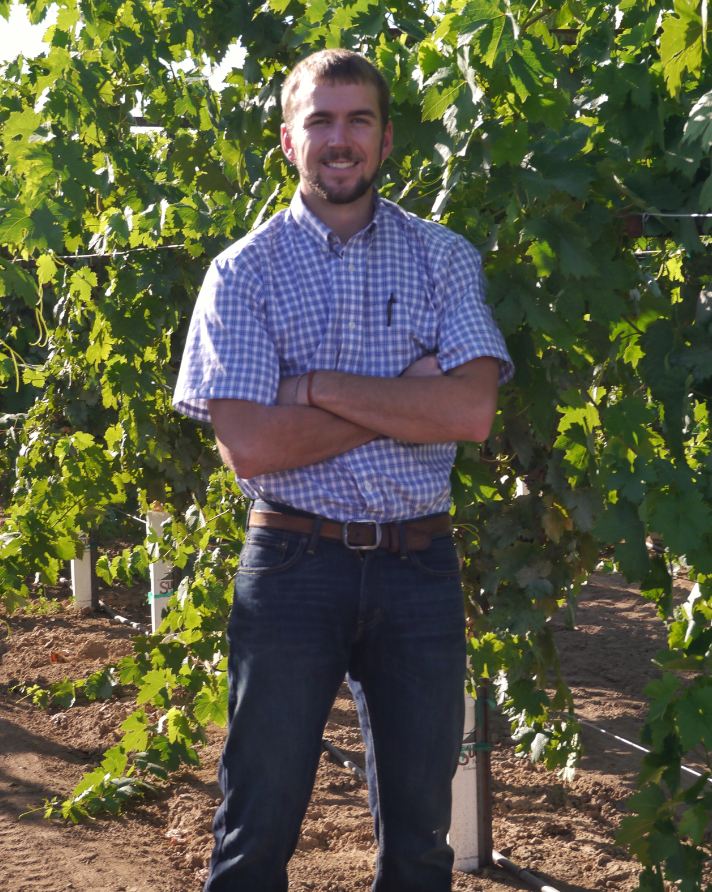 Dan Ostrowski, of Wilbur Ellis, represented Lodi while attending an intensive and hands-on five-day spray application workshop where he learned about cutting edge pesticide spray technologies and practices. The workshop is part of a 2-year program funded by Western Sustainable Agriculture and Research that aims to establish a national network of personnel trained to deliver research-based information on the fundamentals of safe, effective pesticide application. The workshop, which was held at Cornell University in Ithaca, NY, was led by spray expert Dr. Andrew Landers. Dan is now charged with the mission of bringing his newly found knowledge back to Lodi growers. Lodi Winegrape Commission will be working with Dan to host several local meetings on the topic during 2015.
Dan Ostrowski, of Wilbur Ellis, represented Lodi while attending an intensive and hands-on five-day spray application workshop where he learned about cutting edge pesticide spray technologies and practices. The workshop is part of a 2-year program funded by Western Sustainable Agriculture and Research that aims to establish a national network of personnel trained to deliver research-based information on the fundamentals of safe, effective pesticide application. The workshop, which was held at Cornell University in Ithaca, NY, was led by spray expert Dr. Andrew Landers. Dan is now charged with the mission of bringing his newly found knowledge back to Lodi growers. Lodi Winegrape Commission will be working with Dan to host several local meetings on the topic during 2015.
__________________________________________________________________________________
About Dan
 I grew up in Mt. Shasta, CA where my dad worked as a forester for a private timber company. I am always asked if I come from a farming family to which I often reply, “Yes, my dad farms 30,000 acres of trees in the North”. Although this type of farming is different than true production agriculture, my dad’s passion for that land and the trees on it is no different than the way Lodi winegrwers look at their own vineyards. Between trips to the woods with my Dad and growing food with my Mom, I learned respect for the land and the importance of those who take care of it. Spending time with my grandparents in Livingston, CA I learned how much of our land is in agriculture and I met the type of people who understand, depend on, and care for that land. I grew to be passionate about agriculture while attending college and earning a degree in Plant Sciences from UC Davis. I decided to really start my education in agriculture and came to work for Wilbur-Ellis Company as a PCA working in the Lodi area. I work in a variety of crops, but focus mainly on wine grapes.
I grew up in Mt. Shasta, CA where my dad worked as a forester for a private timber company. I am always asked if I come from a farming family to which I often reply, “Yes, my dad farms 30,000 acres of trees in the North”. Although this type of farming is different than true production agriculture, my dad’s passion for that land and the trees on it is no different than the way Lodi winegrwers look at their own vineyards. Between trips to the woods with my Dad and growing food with my Mom, I learned respect for the land and the importance of those who take care of it. Spending time with my grandparents in Livingston, CA I learned how much of our land is in agriculture and I met the type of people who understand, depend on, and care for that land. I grew to be passionate about agriculture while attending college and earning a degree in Plant Sciences from UC Davis. I decided to really start my education in agriculture and came to work for Wilbur-Ellis Company as a PCA working in the Lodi area. I work in a variety of crops, but focus mainly on wine grapes.
I focused on grapevines early in my college career and tailored my education to include most of the viticulture courses offered at UCD. Additionally I worked at Foundation Plant Services with Deborah Golino on the ever evolving scene of grapevine viruses. As a PCA/CCA I work to make informed and well thought-out decisions that are sustainable for not only the business, but for each field’s long term production. I am informed and realistic about production agriculture and rely on my UCD education to aid in scientifically informed decision making. I take a pragmatic approach.
_________________________________________________
If you have any questions or want to schedule an appointment to discuss how to increase the safety and efficiency of your spray applications, feel free to give me a call: (916) 217-6198
_________________________________________________
I have a variety of interests and experiences outside of being a PCA and I like to make good use of my weekends when I am not out in a Lodi vineyard. I was a mountaineering guide on Mt. Shasta for two years, a whitewater rafting, rock climbing, and backpacking guide all through college, a bike shop manager, burger flipper, and a variety of other jobs including working construction, marking timber, and running an ice rink. Currently my number one hobby is whitewater kayaking and if we ever get any rain, I will continue to explore the class III/IV rivers of the West.
I will be contributing to the Lodi Winegrape Commission’s Coffee Shop blog on the topic of spray application technology. We all work to make the most informed decisions when it comes to foliar nutrition and pest and disease management, but often the way that that product is applied to the vine is less than ideal. Rather than preaching better calibration or reducing drift as many application discussions cover, I want to focus my discussion on the ‘why’ you should care and how to get the best results from your application. I want to address the changing landscape of agriculture and how being proactive in investing in application technology will help us prevent drastic legislation that will only hurt California agriculture. You may be tired of the same monotonous discussion of application technology and feel disinterested by air and droplet movement through the canopy, but I want to help refocus your attention to increasing your ability to affect vine health and to control your pest and diseases. Rather than just encouraging you to calibrate more frequently, I want you to become truly interested in a piece of equipment you are likely pumping thousands of dollars through a year and that your entire harvest depends on.

